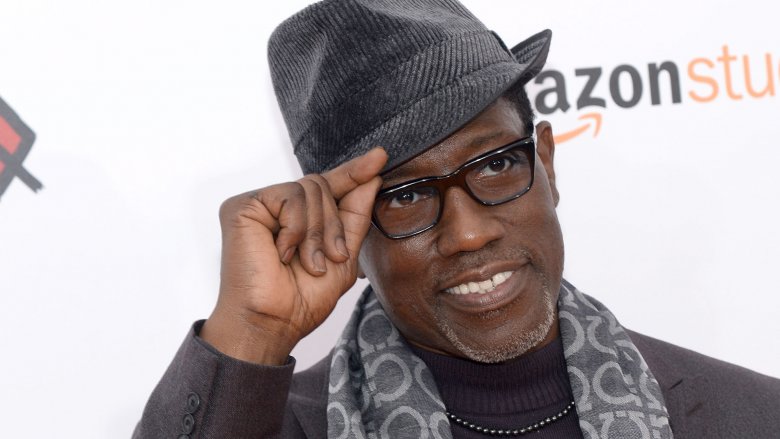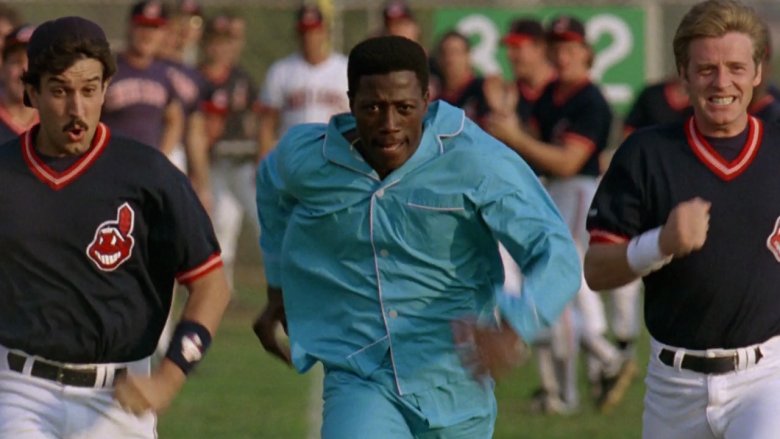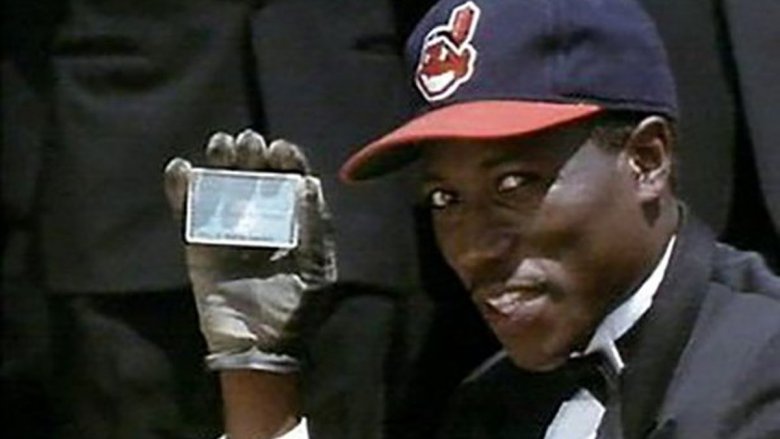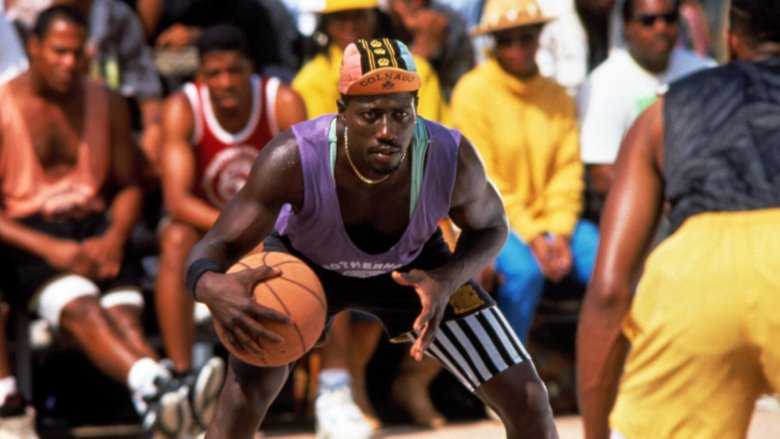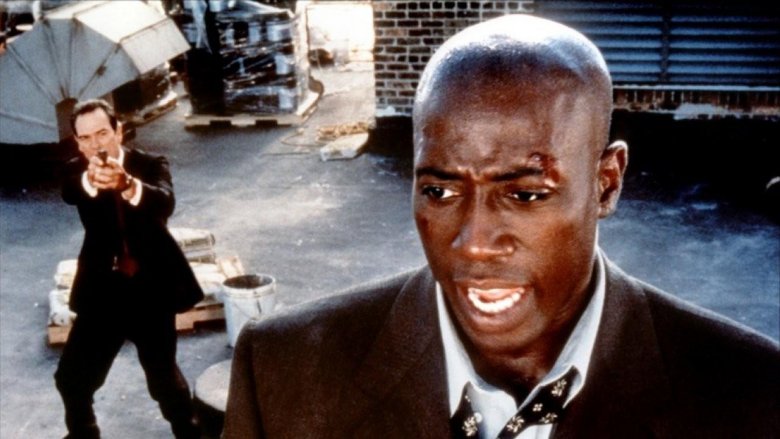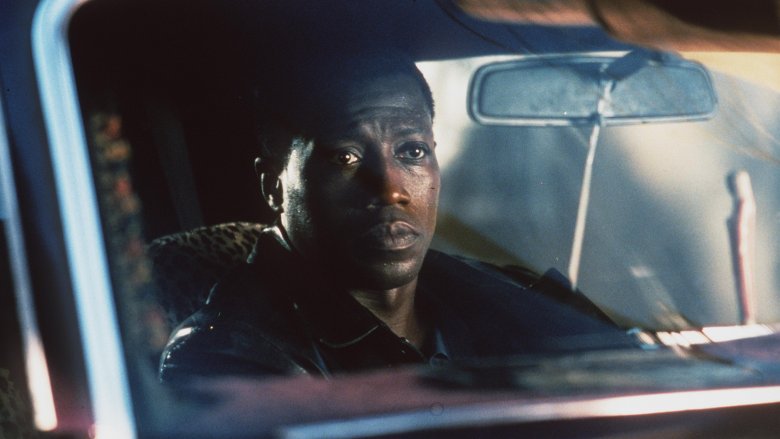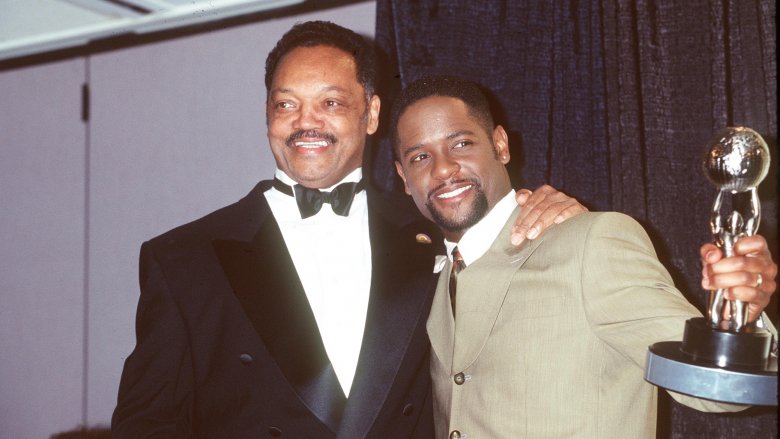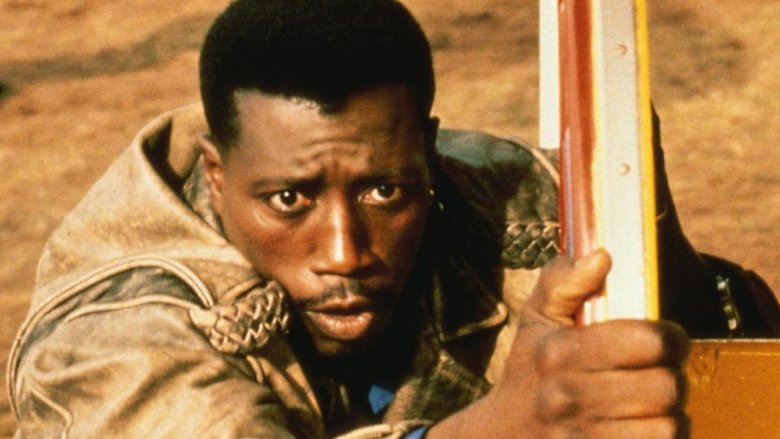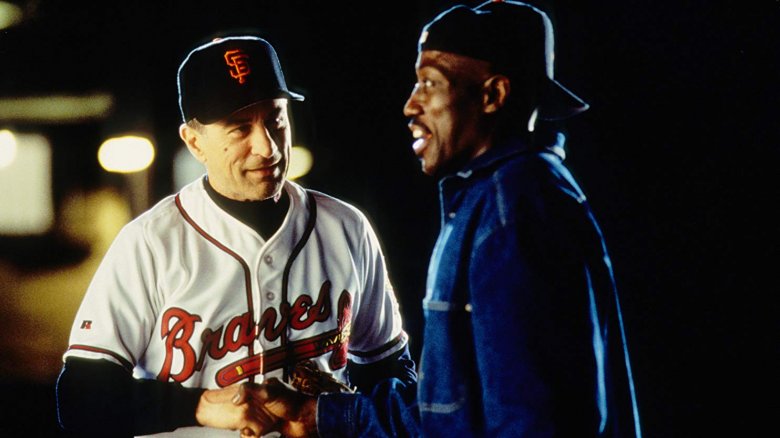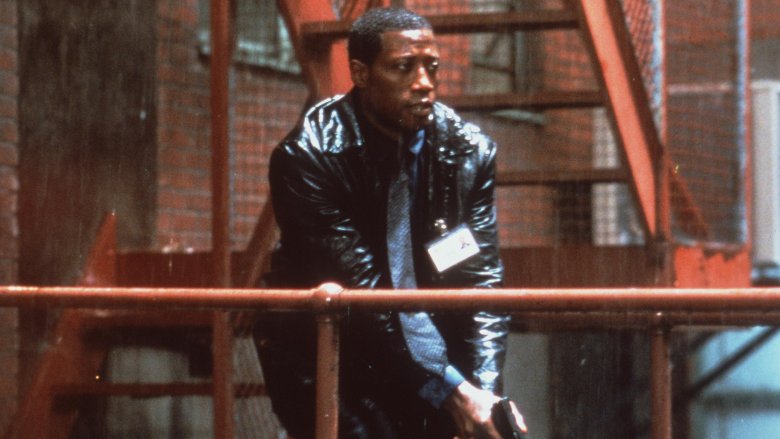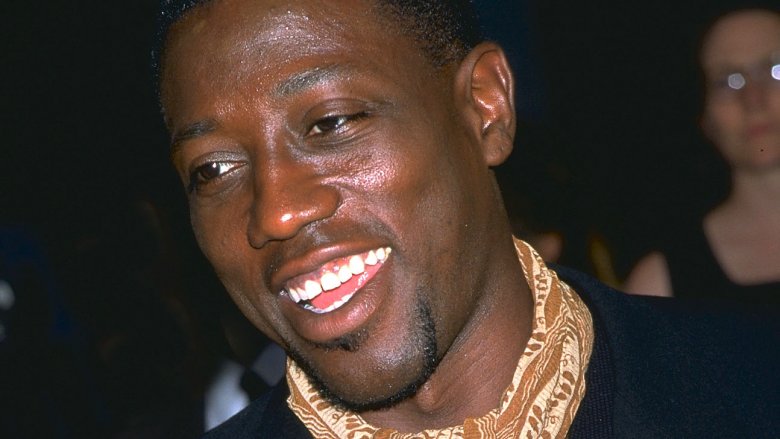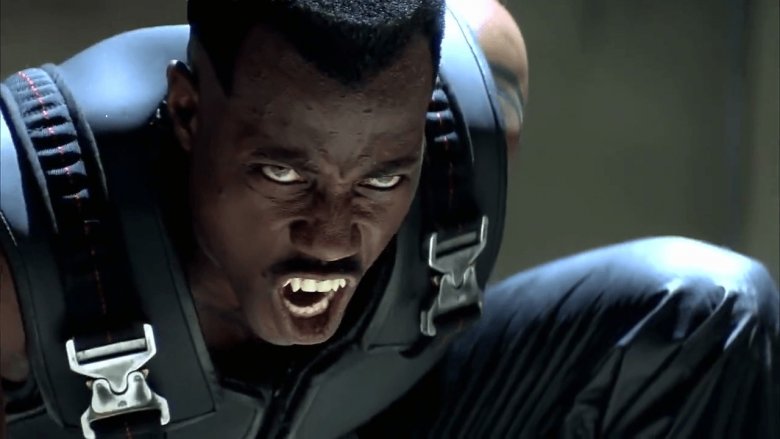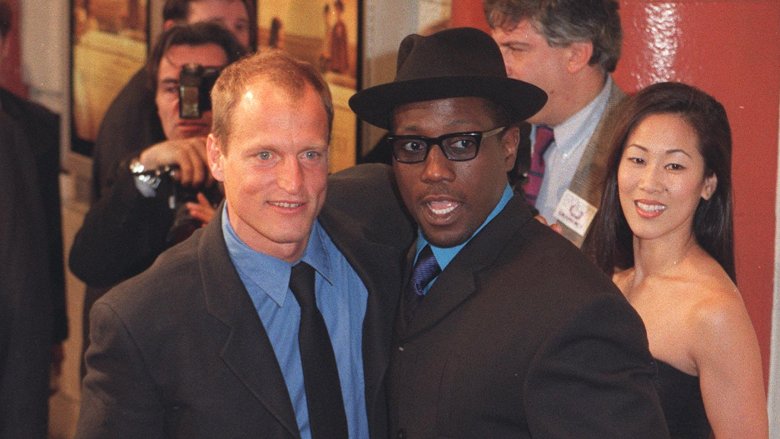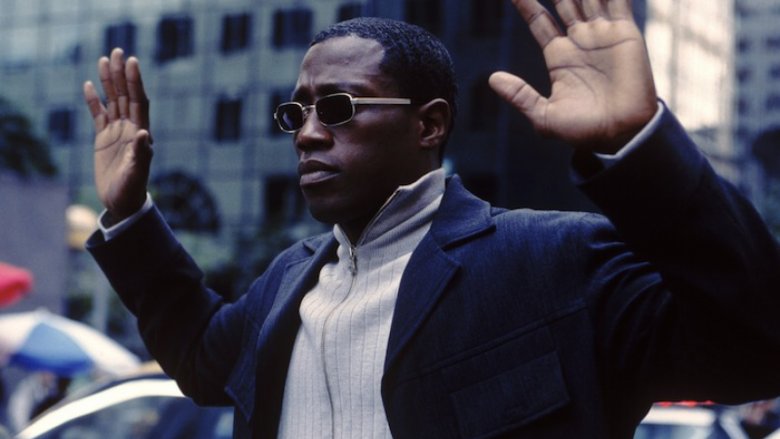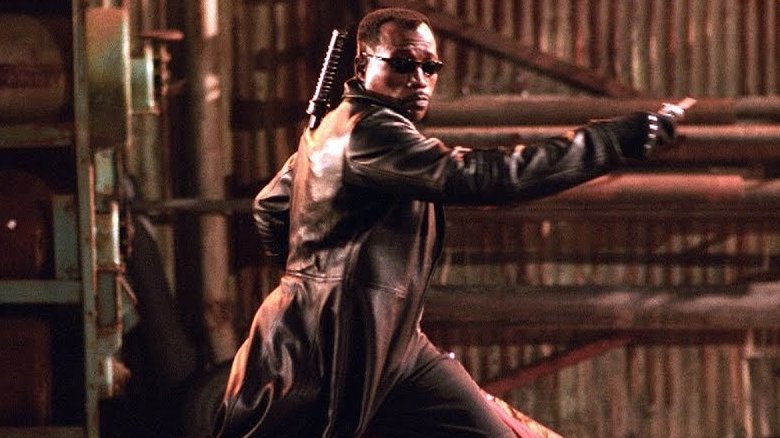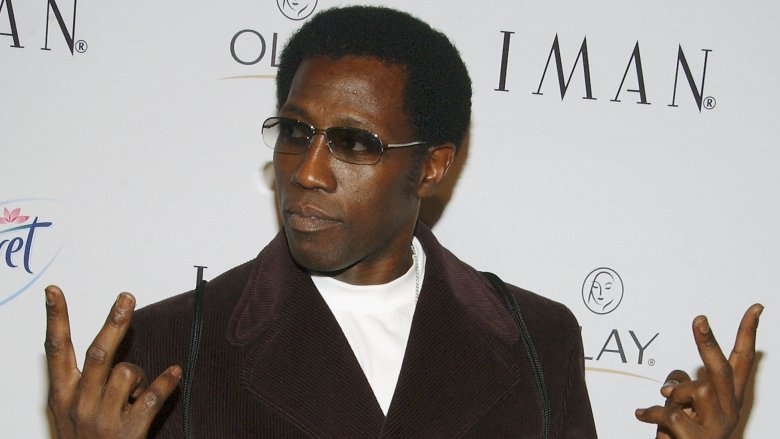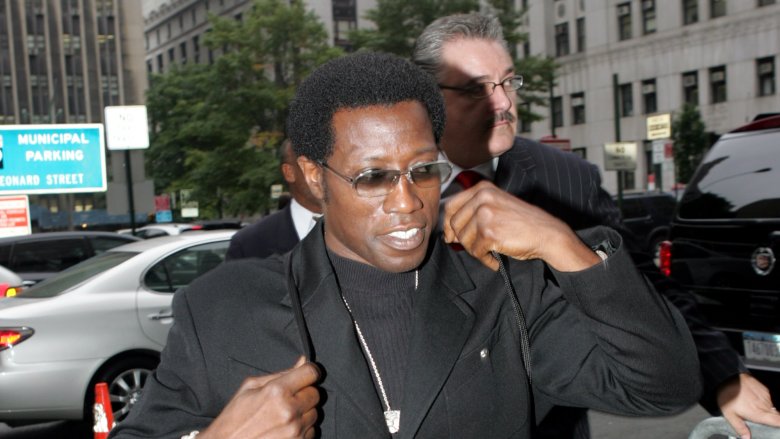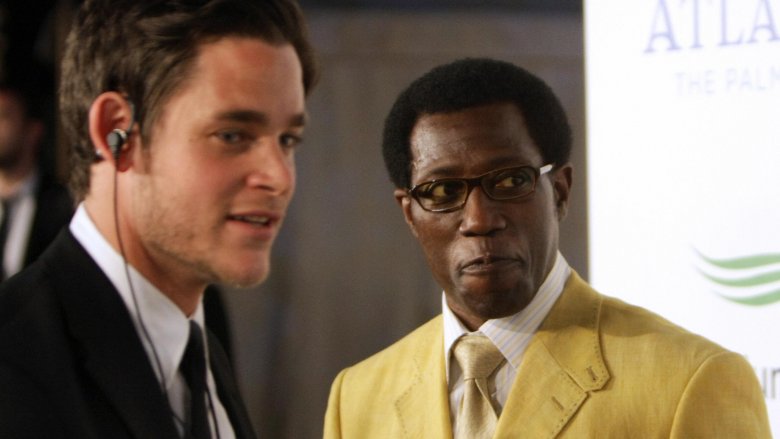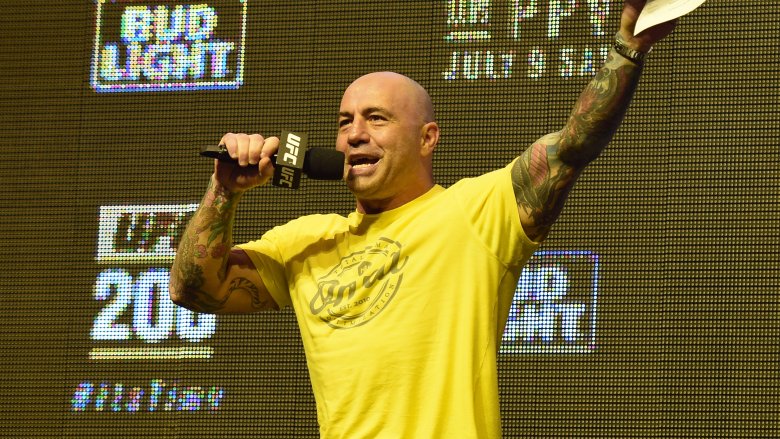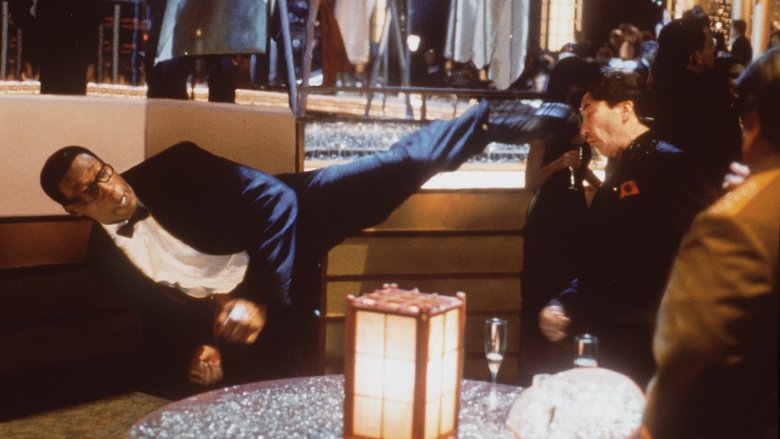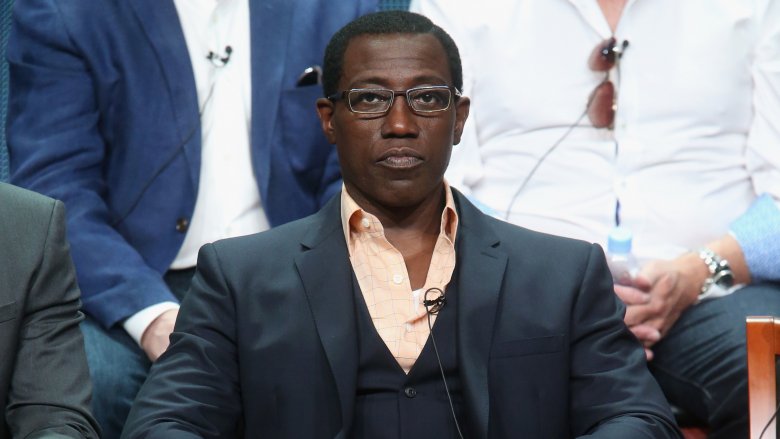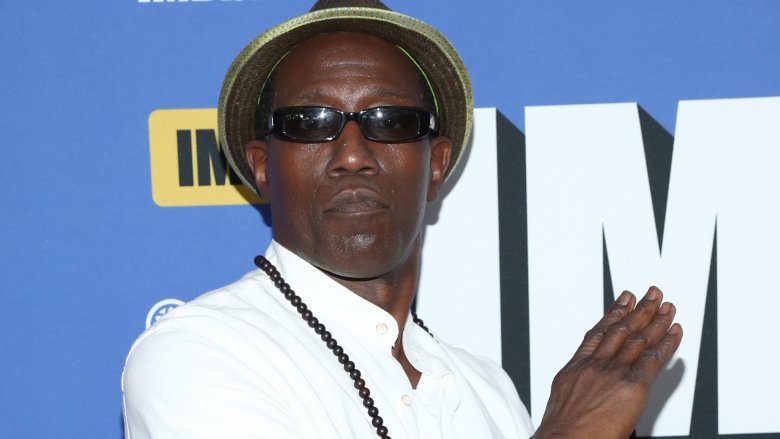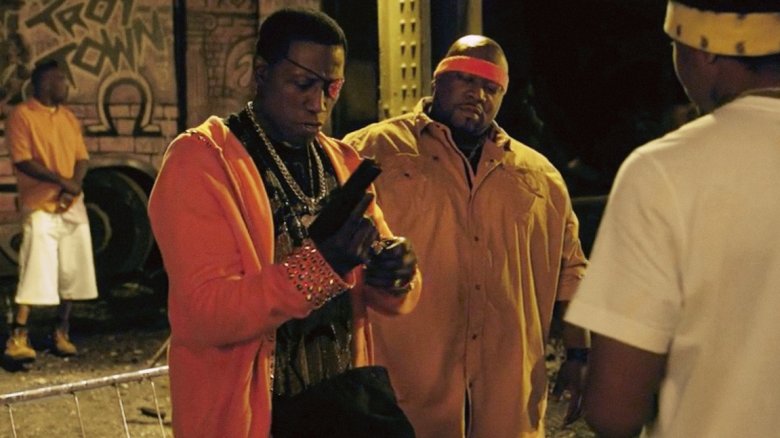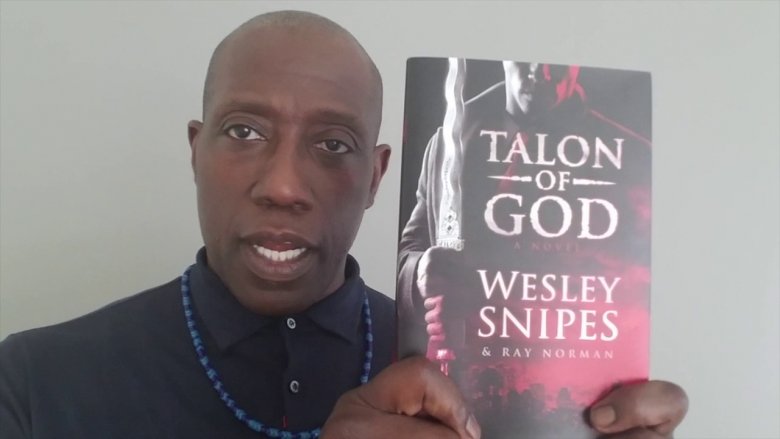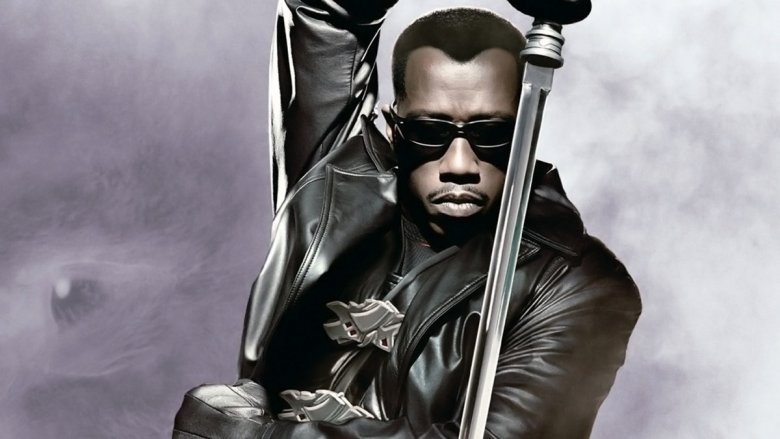Why Hollywood Won't Cast Wesley Snipes Anymore
Once upon a time, Wesley Snipes was one of the most in-demand action stars in show business—and for good reason. Snipes' unique blend of athletic and martial arts abilities with undeniable charisma led to some memorable performances and a handful of blockbuster hits. These days, however, it seems like Hollywood won't go anywhere near him; decades beyond his marquee-topping prime, you're far more likely to see Snipes in a B-list direct-to-video member of the 0 percent club on Rotten Tomatoes.
The man behind Blade is still (arguably) a household name, and Hollywood history is full of stories about talented people who were given second chances after flaming out during their first shot at the big time. So why won't the movie industry cast him in major productions anymore? To answer that question, let's take a look at the ass-kicking actor's career trajectory, in order to pinpoint what exactly went wrong. Here's why Hollywood won't cast Wesley Snipes anymore.
He hit it big in Major League...
Wesley Snipes' career got off to a blazing start when he landed the role of Willie Mays Hayes, the fleet-footed base-stealer who "hit like s***" in baseball comedy classic Major League. Though his batting initially left the Cleveland Indians something to be desired, his charismatic and athletic performance caught the attention of casting directors all over Hollywood, helping skyrocket the young actor to big-league fame.
Some claim, however, that fame went to his head.
...But was too good for Major League II
Wesley Snipes became a Hollywood hot shot so quickly, in fact, he didn't even consider rejoining the cast for Major League II—which notably starred almost everyone else from the original.
Corbin Bernsen, who plays the films' vain third baseman, told Sports Illustrated, "A couple years after Major League I saw Wesley. I said, 'Hey, man, they're gonna make Major League II!' And he was like, 'You're gonna do that?' And I thought, 'Wow, how quickly they forget.' He'd become Wesley Snipes. That rubbed me the wrong way."
He peaked too early
Snipes followed up his breakthrough performance in 1989's Major League with a string of high-profile roles in noteworthy films.
Between 1990-1992, Snipes played Shadow "Sax" Henderson in Mo' Better Blues, Thomas Flannigan in King of New York, Nino Brown in New Jack City, Flipper Purify in Jungle Fever, Sidney Deane in White Men Can't Jump, and Raymond Hill in The Waterdance—all of which can be considered amongst the actor's best performances.
Unfortunately, it all went downhill from there.
He highlighted Hollywood's race problem
Even while riding such a hot streak, Snipes wasn't afraid to shine a light on Hollywood's racial inequality.
"The movie industry right off the bat is geared for white actors," Snipes told Jae-Ha Kim at The Chicago Sun-Times in 1991. "When screenwriters write material, they write with white actors in mind, unless they're black writers like Spike [Lee]. The only roles available to minorities then are specifically designated as for an African-American man or an Asian woman or whatever. That's the nature of this business, but it really fascinates me that so many films can be made with no non-white people in them!"
He was mistakenly arrested by the LAPD...
Snipes' opinions on race were backed up by his first high-profile run-in with the law.
While driving a company car leased by Snipes' own production company, Amen-Ra Films, in 1991, Snipes was allegedly racially profiled and arrested. According to a news report from The Los Angeles Times, Snipes claims he was forced to lie spread-eagled and handcuffed on the pavement with both a knee on his neck and a gun pointed at his head because the car in question had apparently been mistakenly listed as stolen. Snipes was taken into custody and claims he was taunted for hours. "The whole experience was humiliating," Snipes said.
...And the LAPD was called out for it
Snipes' arrest was used to illustrate the difficulties African-American actors in Hollywood faced.
"If he (Snipes) were Tom Cruise this would have never happened," claimed actor Blair Underwood. "They would have realized it was a mistake right away." Ramona Ripston, executive director of the American Civil Liberties Union of Southern California, seconded that notion, stating in a press conference that "because of the criminal profiles used by police in Los Angeles, a black man driving a rental car is an immediate suspect of a crime. So is a black man driving an expensive car, a car with a car phone, or an old, run-down car."
Big names, bad reviews
Racial issues aside, Snipes followed up his tremendous run of good films at the very start of the 1990s with a string of high-profile action roles. He played John Cutter in Passenger 57, Jimmy Mercer in Boiling Point, and Web Smith in Rising Sun. Unfortunately, none of those reviewed well with the critics.
And it would only get worse...
His career cooled off, fast
It appeared Snipes would turn his small slump around after being billed alongside action legend Sylvester Stallone in the very decent Demolition Man, but things only got worse from there. Sugar Hill, Drop Zone, To Wong Foo, Thanks for Everything! Julie Newmar, Money Train, Waiting to Exhale, America's Dream, The Fan, Murder at 1600, U.S. Marshals, One Night Stand, and the Snipes-produced The Big Hit all failed to impress, and Snipes' career started cooling off fast.
He caught two misdemeanors for packing heat
Snipes' second major run-in with the law was brought on, this time, by legitimate reasons—and would put a dent in the actor's professional reputation.
In August 1993, Snipes was cited for carrying a concealed, stainless steel semi-automatic pistol, loaded with half a dozen rounds of hollow point bullets, after a fender-bending motorcycle accident in Hollywood—resulting in a pair of misdemeanors for the once on-screen LAPD officer. Snipes received two years of unsupervised probation and was fined $2,700.
Unlike his previous high-profile encounter with the police, Snipes wasn't particularly bothered by this citation. "The police were just doing their job," Snipes said in a statement. "They were real cool."
He led a state trooper on a high-speed chase
Snipes' reputation as a law-abiding citizen decreased even further in 1994 when the actor led a Florida state trooper on a 120mph high-speed chase, which ended in the action star crashing his motorcycle.
According to The Washington Post, the chase was initiated after a speeding Snipes blew between a marked patrol car and another motorist, and continued for 30 miles. Spokesman David C. Pollick said, "Contrary to rumors of an intentional high-speed chase, Mr. Snipes was unaware of the patrol car trailing him"—which is interesting, considering Snipes crashed his motorcycle after receiving either an intentional or incidental love tap from the front bumper of a clearly-marked police vehicle.
Snipes got off with a citation for reckless driving and refused medical treatment.
Blade single-handedly kept him relevant
Just when it seemed like Snipes' run-ins with the law and string of less-than-stellar performances were on the brink of completely bankrupting his career, the action star bounced back with his most iconic role yet. Of course, we're talking about the titular vampire-slaying superhero in Blade.
Without the help of a big-name costar like Sylvester Stallone, Snipes single-handedly helped Blade rake in $131,183,530 worldwide, at a time when superhero films weren't the cinematic mainstay they are today. Despite only receiving mediocre critical reviews, the film was a massive success, spawning a pair of sequels and cementing Snipes as both a household name and bona fide action hero.
His star on Hollywood's Walk of Fame signaled the end
Following the success of Blade, Snipes finally received validation for all the hard work he put into both the good and bad movies he starred in and/or produced throughout the 1990s. On August 21, 1998, Snipes received his star on the Hollywood Walk of Fame.
Unfortunately, this would all but mark the end of Snipes' career as a blockbuster Hollywood star, as he'd ultimately follow up a brief break from acting with a whole slew of bad movies, a string of poor legal decisions, and pages upon pages of negative press.
His turn of the century flopped
After the commercial success of Blade and having received his star on Hollywood's Walk of Fame, Snipes took a couple of years off. Unfortunately, his return wasn't particularly triumphant—and the start of the 21st century would prove to be the beginning of the end for the actor and producer.
First up was The Art of War, a Snipes-produced U.N. thriller in which he also starred. The film proved to be a massive failure, both critically and commercially, and Snipes never found himself another winner. Guillermo del Toro's assistance on Blade 2, however, almost brought Snipes back from the grave, but both ZigZag and Undisputed dug the hole even deeper.
He tried to sue New Line Cinema
The final nail in the coffin for Snipes was Blade: Trinity, which, in addition to being hands down the worst film in the series, all but ensured major studios would never work with Snipes again—especially after Snipes filed a lawsuit against New Line Cinema and the filmmakers to the tune of $5 million.
According to Variety, Snipes alleged that Blade: Trinity's director, screenplay, and supporting cast were all approved without his express consent, which violated his contract. He also claimed writer-director David Goyer made racist remarks regarding Snipes' professionalism and refused to punish a crew member who wore a racist T-shirt while filming. On top of that, Snipes claimed New Line Cinema intentionally hired only white individuals, still owed him $3 million, and didn't help the actor obtain a tax exemption on the grounds that he was being paid from a Swiss company for a movie being filmed in Canada.
He allegedly didn't cooperate on the set of Blade: Trinity
Legal battle aside, the filming of Blade: Trinity was truly a disaster of epic proportions. Co-star Patton Oswalt told The AV Club it was "a very troubled production." Based on his description, that's quite the understatement.
Oswalt shared, "Wesley [Snipes] was just f***ing crazy in a hilarious way. He wouldn't come out of his trailer, and he would smoke weed all day ... Then I remember one day on the set—they let everyone pick their own clothes—there was one black actor who was also kind of a club kid. And he wore this shirt with the word "Garbage" on it in big stylish letters. It was his shirt. And Wesley came down to the set, which he only did for close-ups. Everything else was done by his stand-in. I only did one scene with him. But he comes on and goes, "There's only one other black guy in the movie, and you make him wear a shirt that says 'Garbage?' You racist motherf*****!"
For his part, Snipes pushed back on Oswalt's version of events in a 2018 interview. "False," he shrugged after Vice asked him to confirm or deny remaining in character throughout his time on the set. "You gotta look at the source of information."
He lost all authority
In addition to calling him a racist, Snipes actually asked director David Goyer to quit, midway through production.
"Wesley sat down with David," Oswalt recalled to The AV Club, "and was like, 'I think you need to quit. You're detrimental to this movie.' And David was like, 'Why don't you quit? We've got all your close-ups, and we could shoot the rest with your stand-in.' And that freaked Wesley out so much that, for the rest of the production, he would only communicate with the director through Post-it notes. And he would sign each Post-it note 'From Blade.'"
He sued New York City
Around the same time that Snipes filed a lawsuit against New Line Cinema and those involved in the production of Blade: Trinity, the actor also filed a lawsuit against the city of New York.
According to People, Snipes claimed that New York City had no jurisdiction to arrest him in the matter regarding an Indiana woman's claims that he fathered her child. The woman, whom Snipes referred to as "mentally ill crack addict," allegedly made similar claims against other celebrities. Snipes also claimed to have never met the woman, and the whole ordeal was detrimental to his reputation—with even Saturday Night Live having fun with the story.
The paternity case against Snipes was ultimately dismissed when a DNA test proved another man to be the child's father. Snipes responded by stating outside the courtroom, "The good Lord says 'Thou shall not bear false witness against thy neighbor.' These are the tenets I live by."
He went to jail for tax evasion
The biggest hit to Snipes' career took place when the actor was convicted on three misdemeanor counts for failing to file three years' worth of tax returns, from 1999-2001—which apparently cheated Uncle Sam out of $7 million. The prosecution blamed Snipes for following the advice of both his accountant and another firm anti-tax proponent.
"People who do it openly and notoriously, you've got to go after them," former IRS commissioner Sheldon Cohen told USA Today. "Not because he's that important or the amount of money is that important, but because there are others who may be foolish enough to follow."
Snipes, who had already paid millions of dollars in taxes, was sentenced to three years in Pennsylvania's McKean Federal Correctional Institution, before being transferred to the New York Community Corrections Office for home confinement.
He almost fought Joe Rogan
With the IRS breathing down his neck and big-time movie projects looking slimmer by the day, Snipes' people tried to arrange a celebrity fight between the actor and Joe Rogan, as a means of grabbing some fast cash.
Recalls the former host of Fear Factor, "So they came to me, and I went 'How much money?' And then they started talking, then I said 'OK, I'll do it.' And they said, 'Are you serious?' And I go, 'Yeah, I'll fight that guy.' So I was like, 'Okay, let's see what happens.' So then there was a bunch of changes to the contract and it was supposed to be 50/50, then it changed and I said okay to that too. I said whatever, let's just do it."
But the match fell through
Though both Snipes and Rogan were eager to throw down in an epic, pay-per-view celebrity martial arts match, the fight never happened.
Still, Rogan is confident he would've emerged victorious. "He's never wrestled, he never had a competitive martial arts match, whether it's a kickboxing fight or karate fight," Rogan said. "I was like 'I'm gonna choke the (expletive) out of this guy. I'm gonna get a hold of him, and I'm gonna squeeze the (expletive) out of him, and they're gonna give me a lot of money, and he's probably not even gonna get hurt.' That's what I thought."
Sadly, we'll never know.
He sued the IRS
As soon as Snipes got out of prison, the Internal Revenue Service piled on the civil tax collections, arguing that the actor owed them upwards of a staggering $18,116,396. Snipes decided he had enough, and filed a lawsuit against the government's tax collection agency.
Snipes argued that the IRS was just arbitrarily throwing out figures in an effort to collect as much money as possible—which directly contradicts their "Fresh Start" program. Created in 2012, the program is supposed to assist those with feeling the burden of financial hardship resolve their tax issues in a manner which is mutually beneficial to both the taxpayer and the government... and it's probably safe to assume an $18 million bill is more beneficial to the latter.
His tax troubles continue
Anyone who's ever had to pay a large tax bill can probably empathize with Snipes' efforts to work out some sort of reduced arrangement with the IRS. That being said, the actor created a bit of an uphill battle for himself while trying to get off the hook for the roughly $18 million the government said he owed after getting out of prison: claiming he couldn't afford to pay the entire amount, he offered roughly $850,000 in compromise. The IRS, unsurprisingly, rejected that offer; undaunted, Snipes held firm even after his amount owed was negotiated down to $9.5 million. In November 2018, a judge denied Snipes' petition to overturn the decision, citing an "inability to credibly document his assets." In other words, the government thought Snipes had larger holdings than he claimed—not the best position to be in for a guy who's already served time for tax evasion.
His recent roles have shown some promise
It's never too late to turn things around.
Though Snipes doesn't get very many big-time movie offers anymore, he still gets plenty of small-time movie offers. Most recently, he's starred in some stinkers like 2017's Armed Response and The Recall, but he wasn't really that bad in either of them. He also had a role in The Expendables 3—which wasn't particularly good but served to put Snipes name back into contention, nonetheless. Even more promising, Snipes played Cyclops in Spike Lee's Chi-Raq, which is undoubtedly the best project to involve the actor in recent decades.
All thing considered, it's not the time to write off Wesley Snipes. Not yet.
He made the most of his time in prison
Whether or not Snipes' three-year prison sentence was justified, the actor accepted the consequences of his actions and used the time to positively re-evaluate his life.
"Jail is a relative term," Snipes told ABC News. "People on the inside know that they're in prison. Right? So there's no illusion there. So then they model their lives based on the value of time that they've learned, the value of consequences for your actions. Yeah? Most people on the outside don't do that. You know, they waste time. They figure they can move through a life without consequences."
He's more interested in dancing
These days, Snipes isn't dead set on making movies. In fact, he's more interested in dancing and musical theatre.
"Doing movies was cool but it still wasn't fulfilling what I wanted to do—even to this day," Snipes told ABC News. "If I have a choice between doing a movie or doing a dance show, I'll do the dance show first. ... I have more martial artist friends and dancer friends than I do acting friends."
He's writing a book trilogy
Snipes is also busy writing what he hopes will ultimately be a trilogy of books, the first of which—Talon of God—is available now.
Snipes told Popcorn with Peter Travers that he welcomed the artistic challenge of writing a lengthy book."What are the limits and the boundaries of my creativity?" he asked. "How can I express the god within me in other ways through my creativity? And what kind of challenge would it be to try to do something like writing a book? Do I have the discipline? Do I have the words?"
The answer to all of those questions was yes.
Still Blade-y after all these years
His career momentum has clearly slowed over the years, but whatever Wesley Snipes has gone through in the public eye since the turn of the century, he deserves credit for his part in helping to spearhead the superhero cinema renaissance that was kicked off in part by Blade's unexpected success. So while it's been years since he played the role—and his public image hasn't been done any favors since his last onscreen vampire slaying—it's easy to understand why Snipes might still be interested in making a Blade comeback.
Somewhat more surprising? According to Snipes, the folks at Marvel are interested in getting him back under that coat and shades. In the late summer of 2018, Snipes told Vice he'd been in various stages of talks with the studio for a couple of years, adding, "Everyone's enthusiastic about it, everybody gets it. But they got a business to run and they gotta square the things that they gotta figure out before they can get to it, I guess. In the meantime, we got a business to run and our own slate of things to do, so..."
Don't hold your breath for a new Blade movie with or without Wesley Snipes, in other words. But this is Hollywood, where stranger things happen every day.
